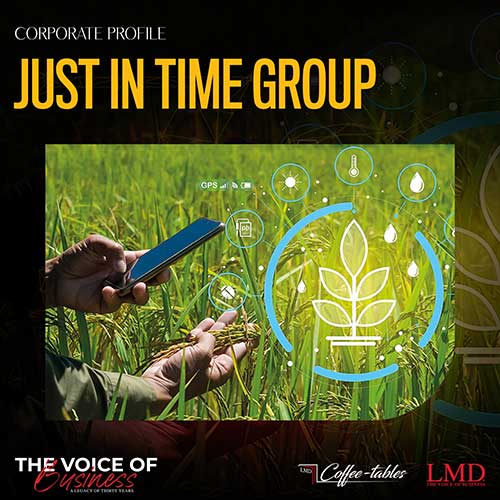REFLECTIONS
FROM THE FIRST DECADE
A selection from LMD’s Cover Stories
MAY 1998
PRIVATISING GOVERNMENT
Justin Belagamage addresses the sensitive issue of bringing free enterprise to government

In his book The Structure of Scientific Revolutions (Chicago, 1970), Thomas Kuhn argues that scientific work is based on certain working assumptions (which he called ‘paradigms’) and that scientific ‘revolutions’ occur when these paradigms outlive their usefulness.
Social scientists who apply Kuhn’s logic to their field of study point out that paradigms upon which today’s social and governmental institutions are built have also become outdated, and that the time has come to replace them with new ones – paradigms that truly reflect today’s social, economic and global realities.
EVOLUTIONARY THEORY Writing to the Harvard Business Review in 1996 – Managing Government, Governing Management – Prof. Henry Mintzberg of McGill University, Montreal, Canada, observed that even today, most governments are unable (even reluctant) to abandon their mindsets – mindsets which are based on the theory that their people are ‘subjects’ of the state, whose duty is merely to pay allegiance to the government.
He argued that the conditions upon which the old paradigm was built are no longer valid and that it has to be replaced with a more enlightened approach – one which is based on the evolutionary theory that people deserve to be treated equitably, regardless of their status or rank in society… that they should be regarded as ‘customers’ rather than ‘subjects’ of the state.
RESISTING CHANGE There are many reasons for politicians and bureaucrats to resist change, the most potent being their passionate love affair with the status quo.
In a situation where the people are empowered – enabling them to make their own decisions and choices, without interference from government or bureaucracy – and where competition drives government agencies that are focussed on achieving service excellence, the people who lose out most are those who have a vested interest in perpetuating the existing system… those who have to part with the power they enjoy, and the privileges and perquisites associated with it.
In modern democracies, politicians understand – at a visceral level – the helplessness of their constituents between elections. This stems from their inability to wield power in a way that will force politicians or bureaucrats to do what is good for the people.
Once in power, and depending on how the system works, politicians rarely have to worry about the wishes of the people – on how to structure taxes or how to utilise tax revenue. Also, governments do not fear having to close shop and go home – as is the case in private enterprises if customers abandon them as a result of poor service.
Another factor which perpetuates this sad state of affairs is people’s pervasive belief that things can never be changed, given their powerlessness to do anything about them, at least until the next time round – come election time!
But there are signs that things are beginning to change, albeit slowly. There are rumblings of a quiet ‘revolution’ across the globe today. This is bound to gather momentum as time passes, and it will force politicians and bureaucrats to take note of dissension among the people, regarding the manner in which they are being served and treated by government institutions and agencies. In this process, a redefinition of the role of public agencies – in terms of market forces and competition, rather than perceptions of politicians and bureaucrats, as to the needs of the people – is also taking shape.
VALUE FOR MONEY People are becoming increasingly aware that the old bureaucratic mechanism that is used by governments as a vehicle to provide services to their communities at large has become overly cumbersome and costly; ineffective; and for the most part, simply useless. Some governments, especially in North America, and particularly at provincial, state and municipal levels, are trying to change their service delivery systems and administrative mechanisms, to keep pace with changing conditions and to provide value for money services to their communities, mainly by bringing entrepreneurism to the public sector.
The basic premise upon which the argument for introducing principles of free enterprise to government is based is that existing bureaucratic systems have inbuilt biases curtailing service excellence – and that, therefore, they have to be replaced. It has been rightly pointed out that the budgetary, personnel, accounting and audit systems utilised by bureaucracies breed mediocrity, inefficiency, waste and sloth.
Budgets encourage waste (non-use of allocated funds, for example, is considered a deviation) while accounting and audit systems are more to do with keeping neat records, to ensure that spending is in line with the established rules and guidelines. This scenario ignores the quality enhancements of output resulting from such spending. It has been argued that this predicament can only be corrected by making the people who spend public funds accountable for achieving results that are consistent with spending levels.
Furthermore, hierarchical and centralised bureaucracies can thrive only under one-size-fits-all mass markets, of which pervasive illiteracy is the hallmark. They cannot function with any degree of integrity in the information rich and knowledge intensive societies of today.
Considering the overwhelming changes that are occurring today, there is no reason for government bureaucracies to be allowed to ignore basic service dimensions such as timeliness, courtesy, accuracy, convenience etc. in serving people. There is also no reason why they should not use customer feedback mechanisms (customer surveys, focus groups, customer contact reports, interviews, customer councils, complaint tracking systems etc.) used by private enterprises as a means of providing service excellence to their people – their ‘customers.’
CUSTOMER FEEDBACK An excellent example of how positively governments can respond to the changing needs of their constituents comes from the province of Ontario, Canada.
With a view to improving levels of service to the community they serve, the provincial government of Ontario undertook a study of its service delivery system – by using a conceptual model developed by three professors at Texas A&M University – to identify gaps that existed between the level of service provided and the level of service expected by the residents of the province.
In order to identify these gaps, the study utilised customer feedback mechanisms such as focus groups, in-depth interviews and customer surveys. In 1992, the province published its report ‘Best Value for Tax Dollars,’ which identified five major areas where gaps existed (service quality, understanding, design, communication and delivery).
The government used the findings to develop strategies to bridge these gaps. In developing each strategy, attention was paid to such factors as the levels to which service could be improved as a result of changes, resource requirements to implement the changes, time frames to achieve tangible results from the improvements and the means of measuring improvements in service levels.
How customer driven systems, patterned after private sector practices, have been successfully implemented by local governmental agencies across the United States has been extensively documented by David Osborne and Ted Gaebler in their inspiring book Reinventing Government: How the Entrepreneurial Spirit is Transforming the Public Sector (1993).
In Minnesota in the United States, there is a programme called STEP (Strive Toward Excellence in Performance), which provides opportunities to innovators within the existing system to put into practice their ideas without interference from their bosses or budget imposed constraints. Year after year, hundreds of employees operating within the system compete to have their ideas designed by STEP, which goes to show how much they strive to change a system they know is not working well.
In Phoenix, Arizona, the public works department competes head-to-head with private bidders for municipal contracts such as garbage collection, street repairs and other municipal services.
The Michigan Department of Commerce has a customer service chief and an ombudsman to deal with complaints from small businesses. The department conducts classes for its staff in customer orientation and uses customer feedback mechanisms as an integral part of its service delivery process. The slogan of the department is ‘Customer Service Is Our Reason For Being.’
A small town in California (population – 77,000) undertakes annual surveys of its citizens to find out their views on the performance of each of its municipal departments.
In Bangalore, India, an experimental project developed a ‘citizen’s report card’ to review public services undertaken by local authorities. Using customer feedback techniques, the project identified eight public utilities most often used by the community, and ranked them in terms of service delivery and citizen satisfaction. An objective of the project was also to analyse problems encountered by citizens – problems arising from corruption, inaccurate billing and poor service quality endemic within the system. The report card was published in the local press, which forced some agencies cited in the report to alter their ways, at least for the time being.
In the Philippines, an award system called Gawad Galing Pook (GGP) was launched in 1993, the objective being to identify and recognise local government units that had endeavoured to prove that higher levels of performance can be achieved through a judicious exercise of powers with which they had been vested by legislation.
The two underlying goals of the GGP programme are to provide public recognition to local government initiatives that address the important social and economic needs of the community, and to become a vehicle to inspire other communities to replicate such initiatives.

OBSTACLE TO PROGRESS For developing economies such as Sri Lanka’s, where the quality of service delivery by most governmental agencies has fallen to appalling depths – due to bureaucratic red tape and the apathy on the part of those who are charged with the task of delivering services – the crying need is to instigate measures that will drastically change the systems that have so badly failed us.
Transition from a centralised system to a market economy has produced a need to redesign our systems to meet the rigorous demands of a marketplace that is now connected globally to other economies. We cannot expect to reap the true benefits of a market economy while operating within a framework which has without doubt become a huge obstacle to progress.
FREE ENTERPRISE In order to meet the objective of achieving service excellence at all levels, governments must surely bring principles of free enterprise to the business of governance – enterprise on the part of politicians and administrators, as well as enterprise on the part of the people who form the community, whose creative energies could be utilised to profit the community at large.
The best way to achieve this is by making the people equal partners in running government and giving them what really belongs to them – control of their lives and the right to make choices with minimal interference from government. Viewed from this perspective, the true role of government will be seen more and more as that of a catalyst – a change agent – rather than one which is vested with the authority to make decisions on behalf of the citizenry.
Infusing a spirit of free enterprise into the government also presupposes breaking up monolithic (and monopolistic) state institutions (the kachcheri system, for example), into controllable, free standing and smaller organisational units for which measurable standards are established.
By and large, these units must be self-funding but where state assistance becomes necessary, the criterion for funding should be based on performance rather than budgets. Managers of these units, whilst being accountable for their performances, should be given substantial autonomy in making decisions pertaining to their units – to find creative solutions to problems, in order to increase service delivery levels because of the competition they have to face from other, similar units competing for their business.
In view of the quantum of budgetary deficits that are faced by developing economies such as Sri Lanka’s and the inefficiencies that are endemic in their current systems, these governments have been compelled to search for new and more innovative ways of doing things.
SOUL-SEARCHING Transitions from old paradigms to new ones always involve much soul-searching. One of the early challenges that will have to be faced during this period of transition is to allay fears – in the minds of the people – that bringing free enterprise to government is like running it on a bottom line profit basis… further jeopardising the economically vulnerable segments of society.
Rather, the purpose is to make life easier and more meaningful – through a participatory form of government and by bringing an end to a system that has outlived its purpose.
TIME IS NOT ON OUR SIDE The extent to which our politicians and bureaucrats have understood this new reality is a matter for speculation. But what is clear is that the present system surely cannot survive in the new millennium in its current form.
Understanding the imperatives and initiating this process of change is one of the most critical challenges faced by the political leadership of Sri Lanka today. And it is a process that should begin now because time is clearly not on our side.





